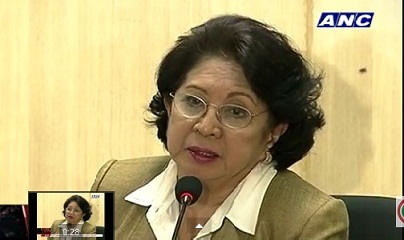Who would not be?
The tragedy happened Jan. 25, 2015. The Ombudsman had suspended Purisima in Dec. 2014 and he was supposed to be not involved in the operations of the PNP.
But details of events that led to the tragedy showed that despite the suspension, President Aquino involved Purisima in official operations.
It was a blatant flouting of the law.
That’s why the Ombudsman’s dismissal of Purisima and 10 other officials last Tuesday is important in terms of restoring the people’s faith in the justice system.
It gave substance to the Consitutional provision that “Public office is a public trust. Public officers and employees must, at all times, be accountable to the people…”
Purisima belongs to a select circle of people t President Aquino believes in and he was not shy about vouching for his good character in public when the investigation was still going on. Yet, Ombudsman Carpio-Morales let the law and evidence prevail.
In a 50-page Consolidated Decision, Morales found substantial evidence to hold Purisima and former officials of the PNP Firearms and Explosives Office (FEO) P/CSupt. Raul Petrasanta, P/CSupt. Napoleon Estilles, P/SSupt. Allan Parreño, P/SSupt. Eduardo Acierto, P/SSupt. Melchor Reyes, P/Supt. Lenbell Fabia, P/CInsp. Sonia Calixto, P/CInsp. Nelson Bautista, P/CInsp. Ricardo Zapata Jr., and P/SInsp. Ford Tuazon liable for Grave Misconduct, Serious Dishonesty and Grave Abuse of Authority.
The case stemmed from two separate complaints filed in 2014 by private citizen Glenn Gerard Ricafranca and the Fact-Finding Investigation Bureau of the Office of the Deputy Ombudsman for the Military and Other Law Enforcement Offices (FFIB-MOLEO) regarding the engagement and accreditation of Werfast as the provider of courier services for renewed firearms licenses.
The Ombudsman’s consolidated decision:
• in May 2011 Werfast proposed an online computerized renewal system and courier delivery service for the renewal of firearms licenses to the PNP which, through Estilles, thereupon entered into a Memorandum of Agreement (MOA) with Werfast even without any procurement, accreditation and qualification process;
• in June 2011, Petrasanta, as Technical Working Group (TWG) Chairman, recommended that the courier system be the sole responsibility of Werfast.
• in September 2011, the MOA was notarized.
• in July and August 2011, the PNP Legal Service issued legal opinions stating that the MOA should be treated either as an unsolicited proposal or a request for accreditation, the engagement of a courier service should not be mandatory but optional, the service provider should not be exclusively Werfast, a set of accreditation rules should be formulated, and an accreditation board should be created.
• in November 2012, Police Director Gil Meneses, then chief of the PNP Civil Security Group (PNP-CSG), ordered the creation of an FEO Courier Services Accreditation Board (FEO CSAB) composed of Petrasanta, Parreño, Acierto, Reyes, Fabia, Calixto, Bautista, Tuazon and Zapata.
• in February 2013, Meneses submitted to Purisima a Memorandum recommending that the delivery of license cards by courier service be made mandatory and declaring that Werfast has been accredited after complying with the documentary requirements under the FEO Policy on Accreditation.
• as it turned out, it was only in March 2013 that Meneses issued the Policy on Accreditation and it was only in April 2013 that the FEO CSAB issued a Resolution accrediting Werfast.
• in March 2014, PNP terminated the contract with Werfast.
The Consolidated Decision found that Werfast was a not a registered corporation at the time of the signing of the MOA in May 2011, as it was incorporated only in August 2011 with a measly capitalization of only P65,000.00
It held that the FEO CSAB disregarded the criteria and forthwith accredited Werfast despite its non-submission of clearance from the PNP Directorate for Intelligence, lack of authority to operate a delivery service, and lack of accreditation by the Department of Science and Technology as it was not even qualified for failing to meet the required capitalization of P500,000.00 to operate in two or more regions in the country. It added that Werfast had no track record in the courier service business or any other business; it is not listed as a subsidiary or local partner of Philippine Remittance Service, Ltd. (Philrem) as it even noted that Werfast turned to LBC, and not to Philrem, in fulfilling its obligations; it paid no income taxes and withheld none from any employees; and it had no machinery, manpower and logistic capability.
In questioning his suspension last December, Purisima said that he relied on” good faith on the regularity in the performance of duties of his subordinates when he approved the recommendation.”
But the Ombudsman found otherwise: “Evidence shows not only that Purisima knew what he was doing in signing the Meneses Memorandum but that he himself exerted pressure and coercion over his subordinates on behalf of Werfast.”
Aside from dismissal, the Ombudsman also imposed the accessory penalties of forfeiture of retirement benefits, cancellation of eligibility, bar from taking civil service examinations and perpetual disqualification from re-employment in government service on Purisima and the 10 other officials involved in the Werfast deal.
Former Senator Panfilo “Ping” Lacson, who was also former PNP chief, was correct: Purisima pushed his luck too far when he stayed on in the police force even when he had resigned as PNP chief after the Mamasapano tragedy.
But then, it’s good that he pushed his luck too far. The damage to the Filipino people was lessened by a few million pesos.
